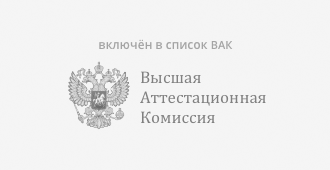HAPPINESS AND WELL-BEING: THE MAIN DETERMINANTS IN THE MODERN WORLD
Keywords:
Happiness, well-being, success, economic behavior, indices, life satisfaction, objective and subjective indicators of human satisfactionAbstract
The object of the study is the categories of “happiness” and “well-being”. The subject of the study is the characteristic features of understanding and defining happiness and well-being in the humanities and social practice. The purpose of the study is to identify in the domestic economic science the concepts associated with the categories of “happiness” and “well-being” and to propose approaches to determining their quantitative values. General scientific methods of analysis and synthesis, dialectical approach to concepts and phenomena, methods of interpretation of secondary data of sociological research are applied. The results of the study are the conclusions confirmed by sociological surveys and indicating the following:
– Russians most often associate a state of happiness with material well-being (income), which allows meeting various needs;
– in the interpretation of happiness as a state of satisfaction with life, gender differences are practically not expressed, at the same time, age-specific features turn out to be very significant;
– in meeting their needs, Russians increasingly associate the feeling of happiness and well-being with managing healthcare costs;
– experts note negative externalities: emotional exhaustion from the prioritization of the desire for income growth and the intergenerational nature of the negative consequences of overstating expectations;
– a situational rethinking of the factors that directly influence stereotypes and the format of a happy and prosperous person is in demand; clarification of the elements necessary to measure happiness and well-being as separate quantities;
– the economic behavior of a person is aimed at satisfying his needs and, thus, is associated with well-being and a sense of success as an attribute of a sense of happiness;
– a sustainable environment is included in the set of indicators of a happy and prosperous life of a Russian;
– an individual’s self-assessment of his own life is the main method of forming subjective indicators of a person’s satisfaction;
– life expectancy is a complex indicator that reflects the impact of objective and subjective factors of a person’s satisfaction with their life (factors affecting a person’shappiness) and their indicators.
The author’s structural model “Human Happiness” which combines the factors that influence the individual’s perception of the state of happiness is proposed.
Downloads
Metrics
References
Татаркевич В. О счастье и совершенстве человека (пер. с польского Л.В.Коноваловой) / В.Татаркевич// М.: Прогресс, 1981.- 368 с.
Шматова Ю. Е. Измерение уровня счастья: литературный обзор российских и зарубежных исследований / Ю. Е. Шматова, М. В. Морев // Экономические и социальные перемены: факты, тенденции, прогноз. 2015. № 3 (39). С.141-162. DOI: 10.15838/esc/2015.3.39.11
Veenhoven R. Questions on Happiness: Classical Topics, Modern Answers, Blind Spots // Subjective Well-Being: An Interdisciplinary Perspective. London, Pergamon Press, 1991. pp 7-26.
Лазарева О.А. Счастье как объект изучения социологии/ О.А. Лазарева// Электронный научно-практический журнал «Психология, социология и педагогика». Режим доступа URL: https://psychology.snauka.ru/2013/10/2492 (дата обращения 04.05.2023).
Булкина Н. А. О феномене счастья: обзор зарубежных и отечественных исследований/ Н.А.Булкина// Мир науки. Педагогика и психология. 2020. №5.Т. 8. С. 1-13https://mir-nauki.com/PDF/26PSMN520.pdf
Фрейд З. Неудовлетворенность культурой: аналитическое повествование. [пер. Л.А. Голлербаха и др.]. М.: Московский рабочий,1990. 176 с.
Успешность в современном обществе: итоги межстранового исследования: монография / А.А. Шабунова, В.Г. Доброхлеб, Е.И. Медведева [и др.]; под ред. В.Г. Доброхлеб, А.А. Шабуновой. Вологда: ВолНЦ РАН, 2022. – 253 с.
Шабунова А.А. и др. Успешность современного человека: теоретико-методологические аспекты исследования / А.А. Шабунова, В.Г. Доброхлеб, Е.И. Медведева, С.В. Крошилин, Л. Сухоцка, В.Р. Шухатович, Г.В. Леонидова, Е.В. Молчанова // Экономические и социальные перемены: факты, тенденции, прогноз. 2019. Т. 12. № 6. С. 27–50. DOI: 10.15838/esc.2019.6.66.2
Макар С.В., Ярашева А.В., Марков Д.И. Финансовое поведение как результат взаимодействия людей в социально-экономическом пространстве // Финансы: теория и практика. 2022. Т. 26. № 3. С. 157-168.DOI: 10.26794/2587-5671-2022-26-3-157-168
Колесник Е.А. Стратегия занятости населения в цифровой экономике // Дискуссия. 2022. №2 (111). С. 50-58. DOI: 10.46320/2077-7639-2022-2-111-50-58
Павлова И.А., Недоспасова О.П., Гуменников И.В. Оценка и мониторинг благополучия старшего поколения в Томской области (по материалам российского индекса благополучия старшего поколения) // Векторы благополучия: экономика и социум. 2021. № 3 (42). С. 89-115.DOI: 10.18799/26584956/2021/3(42)/1121
Терешкова Н.А. Оценка уровня жизни в российских регионах путем расчета индекса благополучия // Вопросы устойчивого развития общества. 2022. № 8. С. 35-44.
Теоретические аспекты применения цифровой модели социальной полезности / В. А. Хайруллин, Е. В. Говердовская, И. Ю. Рассолова [и др.] // Евразийский юридический журнал. – 2020. – № 11(150). – С. 484-485. – EDN WWXDSS.
Downloads
Published
How to Cite
Issue
Section
Categories
License
Copyright (c) 2023 Е. И. Медведева, А. В. Ярашева, С. В. Макар

This work is licensed under a Creative Commons Attribution-NonCommercial-NoDerivatives 4.0 International License.
Авторы, публикующие произведения в журнале «Дискуссия», соглашаются со следующими условиями:
- Авторы сохраняют за собой авторское право и предоставляют журналу право первой публикации произведения, одновременно лицензированной в соответствии с лицензией Creative Commons Attribution, позволяющей другим лицам пользоваться произведением с подтверждением авторства и первоначальной публикации в журнале «Дискуссия».
- Авторы вправе заключать с иными лицами лицензионные договоры на условиях простой (неисключительной) лицензии на использование опубликованного в журнале «Дискуссия» произведения (например, размещение его в базах данных университетов, публикация в книге), со ссылкой на его оригинальную публикацию в этом журнале.
- Автор гарантирует, что является правообладателем всех материалов, предоставляемых в редакцию, и что исключительные права на данные материалы не переданы или не предоставлены другим лицам.
- Авторам разрешено и рекомендуется размещать свое произведение в Интернете до и во время процесса подачи, поскольку это может привести к продуктивному обмену, а также к более раннему и более широкому цитированию опубликованных работ.
С момента загрузки произведения и сопроводительных материалов через раздел "Отправка материалов", автор полностью и безоговорочно принимает (акцептует) публичную оферту о заключении авторского соглашения об опубликовании произведения. В соотвтетствии с этим соглашением автор предоставляет издателю на безвозмездной основе неисключительную лицензию на использование созданного автором произведения.
С момента получения произведения и прилагаемых к нему материалов журнал "Дискуссия" вправе использовать полученные произведения без ограничений по своему усмотрению и в пределах всего срока действия исключительных прав, но с обязательным указанием имени автора (авторов) произведения, в том числе публиковать произведения (полностью или в сокращении) на территории всего мира, переводить на другие языки, направлять в репозитории научной информации, размещать в сети Интернет и использовать другими законными способами.









